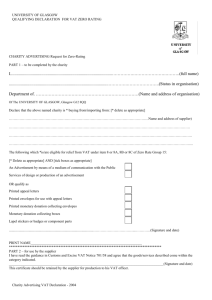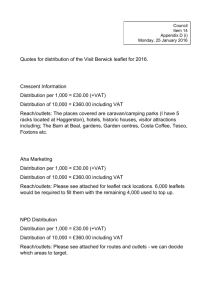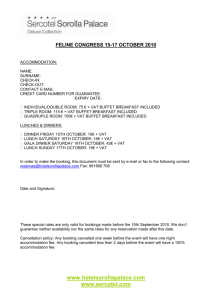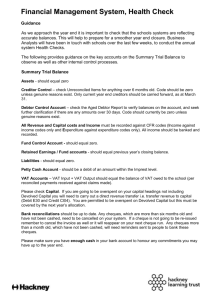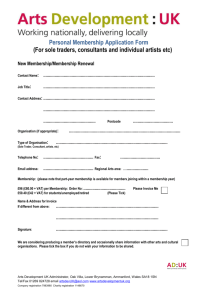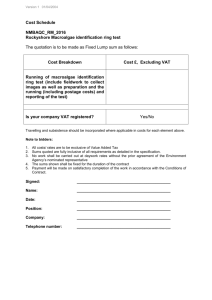Place of Supply of Services
advertisement
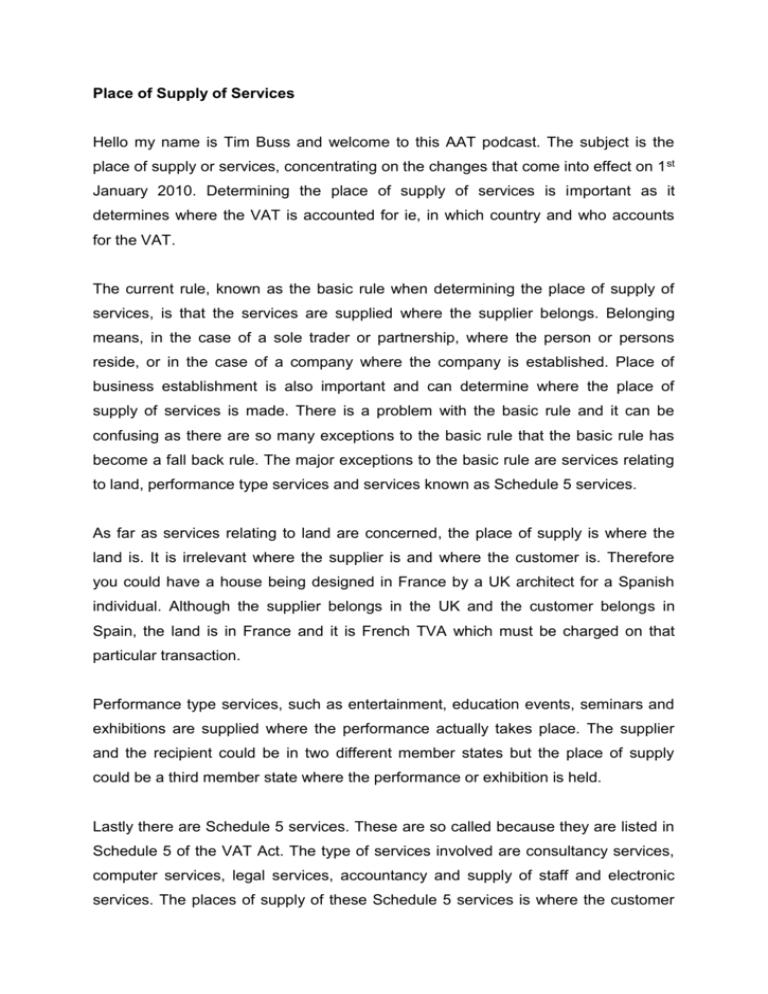
Place of Supply of Services Hello my name is Tim Buss and welcome to this AAT podcast. The subject is the place of supply or services, concentrating on the changes that come into effect on 1 st January 2010. Determining the place of supply of services is important as it determines where the VAT is accounted for ie, in which country and who accounts for the VAT. The current rule, known as the basic rule when determining the place of supply of services, is that the services are supplied where the supplier belongs. Belonging means, in the case of a sole trader or partnership, where the person or persons reside, or in the case of a company where the company is established. Place of business establishment is also important and can determine where the place of supply of services is made. There is a problem with the basic rule and it can be confusing as there are so many exceptions to the basic rule that the basic rule has become a fall back rule. The major exceptions to the basic rule are services relating to land, performance type services and services known as Schedule 5 services. As far as services relating to land are concerned, the place of supply is where the land is. It is irrelevant where the supplier is and where the customer is. Therefore you could have a house being designed in France by a UK architect for a Spanish individual. Although the supplier belongs in the UK and the customer belongs in Spain, the land is in France and it is French TVA which must be charged on that particular transaction. Performance type services, such as entertainment, education events, seminars and exhibitions are supplied where the performance actually takes place. The supplier and the recipient could be in two different member states but the place of supply could be a third member state where the performance or exhibition is held. Lastly there are Schedule 5 services. These are so called because they are listed in Schedule 5 of the VAT Act. The type of services involved are consultancy services, computer services, legal services, accountancy and supply of staff and electronic services. The places of supply of these Schedule 5 services is where the customer belongs. Changes will be made to the place of supply rules from 1 st January 2010 and there will also be a new requirement for suppliers to supply information on intraEU services, where the reverse charge applies. Following the changes that will be introduced on 1st January 2010, the main place of supply rule for business to business transactions will be where the customer has established his or her business. There will obviously be no changes for UK suppliers where the customers belong in the UK. There will also be a new requirement to submit quarterly sales lists for services supplied to businesses liable to the reverse charge in their own member state. The new basic rule for business to business transactions is a step towards simplification because there will no longer be a need to determine whether or not a service falls within Schedule 5 of the VAT Act. Certain services which caused problems before under the old rules, such as management, administration and bookkeeping will now be taxed where the customer has established his or her business. The use of the reverse charge procedure will become more common, there will however still be exceptions to this basic rule. The exceptions are as follows. Services relating to land will continue to be taxed where the land is located. At the time of recording this podcast there is no date as to when this particular exception will be changed. Transport services will be taxed where the transport takes place. Performance type services, entertainment, exhibitions and education events will continue to be taxed where these events are performed or physically carried out. However there will be changes to business to business transactions from 1st January 2011. Place of supply will move to the new basic rule from that date ie. where the customer belongs. With business to private consumer supplies, the place of supply will continue to be where the supplier has established his business. There is an exception where the services are supplied from a fixed establishment in a different member state to the one in which the business is established. In each case the place of supply will be the member state where the fixed establishment is located. This means that if a business has more than one establishment, it is the place most directly concerned with the supply which will dictate where the place of supply is. For Schedule 5 services before 1st January 2010 and all services, but for the exceptions, after 1st January 2010 a UK supplier supplying services to a business in another member state or even outside the member states will not charge UK VAT. The place of supply will be where the customer belongs. This means that in theory a supplier has a responsibility to register in the member state concerned and charge VAT. However as with the current rule there is a simplification procedure known as the reverse charge procedure. Under this procedure the customer accounts for VAT in his or her own member state. VAT is accounted for by adopting the reverse charge, which means converting the suppliers invoice to local currency, charging local VAT and paying that VAT to the VAT authorities in the country concerned. If it is possible this self generated VAT charge can be claimed back on VAT returns. Taking the reverse scenario, where services are imported from suppliers outside the UK, a UK business has a responsibility of undertaking the reverse charge procedure and accounting for UK VAT. This UK VAT is declared to HM Revenue and Customs in box 1 of VAT Returns and the self generated VAT charge can be reclaimed if the business is entitled to claim it’s VAT, in other words the business is not exempt from VAT. From 1st January 2010 there will be a requirement to submit quarterly statements similar to EC Sales Lists for goods or services provided to customers in other member states. For most service businesses, the submission of sales lists is a new requirement and will involve changes to IT and accounting systems. There will need to be processes to collect customers VAT registration numbers, validate VAT numbers, capture the value of services to each customer (and there are different type of supply rules which I will comment on in a moment), differentiate between goods and services, recognise the exceptions to reverse charge services such as services relating to land and performance type services, well these services do not have to be reported on a sales list. The Sales List is a list of VAT registration numbers of customers in other member states and a list of the values of services supplied to each particular customer. There is no requirement to report services supplied to private individuals or to customers in the same member state as the supplier or to customers outside the EU. Under the current rules the time for accounting for the reverse charge from supplies made to a UK business from other member states and outside the EU is the earlier of date of payment or date of invoice. On 1st January 2010 these rules will change, the time of supply for accounting the reverse charge from suppliers outside the UK and for reporting the services made to businesses outside the UK but in another member state of the EU will be the earlier of the performance of the service or the receipt of payment. It should be noted that the invoice date is of no consequence. This will create difficulties for businesses when amending systems to capture the information required. It will be necessary to have systems in place to capture the information on completion of the service rather than the invoice date. HM Revenue and Customs have indicated that they recognise that this will cause problems and will give further advice. At the time of recoding the podcast they have not done so but have stated that initially they will take a broad brush approach and a softly softly approach if businesses have got the time of supply wrong. I said at the start of this podcast that the place of supply is important in determining where the VAT is charged. Both before and after 1st January 2010 certain services have caused particular problems. These are the services which are deemed to be supplied in other member states such as land related services and performance type services. As I said there is going to be no change in the foreseeable future to land related services and until 2011 there will be no change to performance services. The problem is that the place of supply of these services is either where the land is located or where the performance is carried out. Local VAT has to be charged, so for example if the service relates to land in France then French TVA has to be charged on the service. This could result in a UK business having multiple VAT registrations. There are simplification procedures where by the customer will account the VAT using a process similar to the reverse charge, however if you do perform these services in other member states please look at the conditions in each member state very carefully. Some member states have adopted simplification and others haven’t. Where a service is supplied in a member state which has not adopted simplification there will be a requirement for the business to register for VAT in that particular member state and charge local VAT. As I said this could give rise to one or more registrations in different member states. Where a business has adopted simplification then the conditions need to be checked. The normal conditions for simplification to work is that the customer must be registered for VAT in the country concerned. So therefore if land related supplies or performance type supplies are made to private individuals not registered for VAT then there is an onus on the supplier to register for VAT in that particular country. But where the customer is registered for VAT and can provide a VAT number to the supplier then the supplier does not have to register or charge VAT, the supplier’s invoice will be free of VAT with a note saying simplification procedures apply and then the customer will account for VAT on the supplier’s behalf. This has been a brief run down on the place of supply rules, concentrating on the changes from 1st January 2010. Businesses must be aware of the 2010 changes as particularly the rule for submitting quarterly sales lists is a new and onerous requirement. It will affect many businesses who have not had to consider the issues before. There is information on the Customs website on the changes coming into place on 1st January 2010 and these should be looked at carefully.



